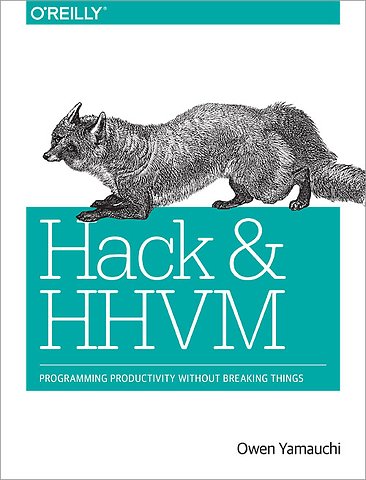


Owen Yamauchi is a software engineer at Facebook where he works on the HHVM team. Before joining Facebook in 2009, he interned VMware and Apple.
Meer over Owen YamauchiHack and HHVM
Programming Productivity Without Breaking Things
Samenvatting
How can you take advantage of the HipHop Virtual Machine (HHVM) and the Hack programming language, two new technologies that Facebook developed to run their web servers? With this practical guide, Owen Yamauchi—a member of Facebook’s core Hack and HHVM teams—shows you how to get started with these battle-tested open-source tools.
You’ll explore static typechecking and several other features that separate Hack from its PHP origins, and learn how to set up, configure, deploy, and monitor HHVM. Ideal for developers with basic PHP knowledge or experience with other languages, this book also demonstrates how these tools can be used with existing PHP codebases and new projects alike.
- Learn how Hack provides static typechecking while retaining PHP’s flexible, rapid development capability
- Write typesafe code with Hack’s generics feature
- Explore HHVM, a just-in-time compilation runtime engine with full PHP compatibility
- Dive into Hack collections, asynchronous functions, and the XHP extension for PHP
- Understand Hack’s design rationale, including why it omits some PHP features
- Use Hack for multitasking, and for generating HTML securely
- Learn tools for working with Hack code, including PHP-to-Hack migration
Specificaties
Inhoudsopgave
Preface
1. Typechecking
-Why Use the Typechecker?
-Setting Up the Typechecker
-Type Annotation Syntax
-Hack’s Type System
-Rules
-Type Inference
-Refining Types
-Enforcement of Type Annotations at Runtime
2. Generics
-Introductory Example
-Other Generic Entities
-Type Erasure
-Constraints
-Unresolved Types, Revisited
-Generics and Subtypes
-Advanced: Covariance and Contravariance
3. Other Features of Hack
-Enums
-Type Aliases
-Array Shapes
-Lambda Expressions
-Constructor Parameter Promotion
-Attributes
-Enhanced Autoloading
-Integer Arithmetic Overflow
-Nullsafe Method Call Operator
-Trait and Interface Requirements
-Silencing Typechecker Errors
4. PHP Features Not Supported in Hack
-References
-Old-Style Constructors
-Case-Insensitive Name Lookup
-Variable Variables
-Dynamic Properties
-Mixing Method Call Syntax
-isset, empty, and unset
-Others
5. Collections
-Why Use Collections?
-Collections Have Reference Semantics
-Using Collections
-Type Annotations for Collections
-Interoperating with Arrays
6. Async
-Introductory Examples
-Async in Detail
-Structuring Async Code
-Other Types of Waiting
-Common Mistakes
-Async Extensions
7. XHP
-Why Use XHP?
-How to Use XHP
-Creating Your Own XHP Classes
-XHP Best Practices
-Migrating to XHP
-XHP Internals
8. Configuring and Deploying HHVM
-Specifying Configuration Options
-Server Mode
-Warming Up the JIT
-Repo-Authoritative Mode
-The Admin Server
9. hphpd: Interactive Debugging
-Getting Started
-Evaluating Code
-The Execution Environment
-Using Breakpoints
-Viewing Code and Documentation
-Macros
-Configuring hphpd
10. Hack Tools
-Inspecting the Codebase
-Migrating PHP to Hack
-Transpiling Hack to PHP
Index
Anderen die dit boek kochten, kochten ook
Rubrieken
- cadeauboeken
- computer en informatica
- economie
- filosofie
- flora en fauna
- geneeskunde
- geschiedenis
- gezondheid
- jeugd
- juridisch
- koken en eten
- kunst en cultuur
- literatuur en romans
- mens en maatschappij
- naslagwerken
- non-fictie informatief/professioneel
- paramedisch
- psychologie
- reizen
- religie
- schoolboeken
- spiritualiteit
- sport, hobby, lifestyle
- thrillers en spanning
- wetenschap en techniek
- woordenboeken en taal





